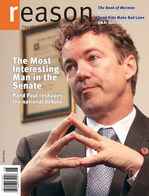Rand Paul Stages Senatorial Sit-In for Debate on Sunsetting Authorization for Endless War
Paul announces that his move won four hours of floor debate in Senate over ending the 16-year-old Authorization for the Use of Military Force that launched modern war on terror.
Sen. Rand Paul (R-Ky.) had a major breakthrough in national recognition in 2013 with his filibuster regarding presidential power to unilaterally kill American citizens; he's a politician who understands the benefits of public procedural power plays.

He did another one today, to demand debate over some of his proposed amendments to the National Defense Authorization Act, specifically involving the reauthorization of the Authorization on Use of Military Force (AUMF) that launched the modern war on terror.
"An attempt was made to run the clock on the bill overnight. I objected and am now sitting on the floor of the Senate to stop that," he tweeted two hours ago, part of a long series of tweets today on the topic.
"The Senate is now in a quorum call, unable to act because of my protest. This is why I sit on the floor, in silent protest," he further stated. "I will continue this protest and these objections for as long as needed to ensure Congress do its duty, and vote on ending these wars."
About an hour ago as of this posting, Paul announced via tweet that he had a victory: "Senate leaders have agreed not to try to end debate early, and have agreed to four hours of debate under my control to debate these wars."
"The Senate attempted to shorten debate [and] move forward without consideration [and] debate on my amendment to end our AUMF in Afghanistan and Iraq," he began his series of tweeted critiques of his colleagues. "Where is the anti-war left demanding the wars end? Where is the constitutional conservative right demanding Congress reclaim its war powers?"
For the latter he had a special slam: "Hypocrites, they pretend concern over our constitutional duty to declare war and then block any vote on ending any of our 7 current wars."
He also made it clear the vital imperative underlying his insistence on getting his way on this vote: "Tonight I sit silently to protest the thousands of American soldiers who have died over the past decade in these wars."
Paul laid out his reasons for wanting to finally let lapse the AUMF launched 16 years ago in an op-ed today at Rare:
these authorizations to use military force are inappropriately being used to justify American warfare in 7 different countries. Sunsetting both AUMFs will force a debate on whether we continue the Afghanistan war, the Libya war, the Yemen war, the Syria war, and other interventions….
If we don't get this rudderless foreign policy under control now, we'll still be asking the same questions another 16 years down the road….
Repealing the 2001 and 2002 AUMFs would restore respect for the balance of power and reassert Congress' voice by forcing legislators to specifically approve or disapprove the direction of our foreign policy. If my provision passes, the authorizations would sunset six months later, allowing Congress time for a thorough debate about how we will move forward….let's utilize the same focus and discipline we expect of our military to give them specific authorization as each unique situation warrants.
My amendment would give the U.S. Senate that chance.
It's a chance that many of our representatives will doubtless be happy to evade, but Paul's boldness on the issue might force them to go on-record on their seriousness over legislative power over decisions about war.


Show Comments (37)